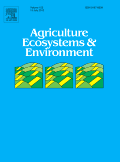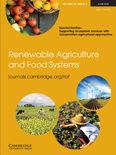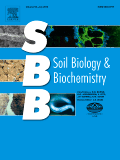
AGRICULTURE ECOSYSTEMS & ENVIRONMENT
Scope & Guideline
Pioneering Insights in Ecosystem Management and Agronomy
Introduction
Aims and Scopes
- Sustainable Agricultural Practices:
The journal emphasizes research on sustainable farming techniques that can increase productivity while minimizing adverse environmental effects. This includes studies on organic farming, agroecology, and conservation practices. - Ecosystem Services and Biodiversity:
A significant focus is on how agricultural practices affect biodiversity and ecosystem services, such as pollination, soil health, and water quality. This includes research on habitat management and the role of non-crop vegetation. - Soil Health and Carbon Dynamics:
Research on soil management practices, including the impacts of different fertilization strategies, cover cropping, and tillage on soil health and carbon sequestration is a core area of interest. - Climate Change Adaptation and Mitigation:
The journal addresses the challenges posed by climate change to agricultural systems and explores adaptive practices that enhance resilience while also mitigating greenhouse gas emissions. - Integrated Pest Management (IPM):
There is a robust focus on research that examines pest management strategies that reduce reliance on chemical pesticides, promoting biological control and habitat management.
Trending and Emerging
- Agroecology and Biodiversity Enhancement:
There is an increasing emphasis on agroecological approaches that promote biodiversity within agricultural systems, with research highlighting the benefits of diverse cropping systems and habitat management. - Soil Carbon Sequestration Techniques:
Research is trending towards innovative practices that enhance soil carbon sequestration, such as biochar application, cover cropping, and no-till practices, as part of climate change mitigation strategies. - Water Management in Agriculture:
Emerging themes include the sustainable management of water resources in agriculture, particularly in the context of climate variability and water scarcity, highlighting practices such as drip irrigation and rainwater harvesting. - Pollinator Health and Management:
Research focusing on the health of pollinators, their role in agricultural productivity, and strategies to enhance their populations through habitat management and integrated pest management is gaining traction. - Microbial Ecology in Agroecosystems:
There is a growing interest in the role of soil microbial communities in agroecosystem functioning, particularly in relation to nutrient cycling, soil health, and the impacts of different agricultural practices.
Declining or Waning
- Conventional Agricultural Practices:
Research focused on conventional farming methods that rely heavily on chemical inputs and monocropping is less prevalent, as the journal increasingly prioritizes sustainable practices. - Single-Crop Systems:
Studies centered on the impacts of monoculture cropping systems are diminishing, reflecting a shift towards advocating for diversification and polyculture systems. - Traditional Pest Control Methods:
There is a noticeable decline in research related to traditional pest control methods that do not incorporate ecological considerations, as the focus shifts towards integrated and ecological pest management strategies.
Similar Journals

RENEWABLE AGRICULTURE AND FOOD SYSTEMS
Empowering research for renewable agricultural practices.RENEWABLE AGRICULTURE AND FOOD SYSTEMS, published by Cambridge University Press, is a leading open-access journal dedicated to the advancement of sustainability in agricultural practices and food systems. With an ISSN of 1742-1705 and an E-ISSN of 1742-1713, this journal spans the interdisciplinary fields of agronomy and food science, achieving a commendable Q2 ranking in both categories for 2023. As it continues to converge through the years from 2004 to 2024, the journal offers a platform for researchers, professionals, and students to disseminate transformative research that addresses the challenges of food security, resource management, and environmental impact. The journal’s significant impact is underscored by its Scopus rankings, situating it in the 77th percentile among agronomy and crop science publications, and the 67th percentile in food science. Since becoming fully open access in 2023, RENEWABLE AGRICULTURE AND FOOD SYSTEMS promotes wider accessibility to vital research findings, fostering collaboration and innovation in the pursuit of sustainable agricultural practices and food systems worldwide.

Bioagro
Connecting minds through groundbreaking agricultural science.Bioagro is an esteemed academic journal dedicated to advancing research in the field of Agricultural and Biological Sciences. Published by the University Centroccidental Lisandro Alvarado in Venezuela, this journal has made significant strides since its inception in 2008, with a focus on delivering high-quality research publications that address contemporary challenges in agriculture and biology. Recognized for its contributions, it holds a Q3 ranking in the Agricultural and Biological Sciences (miscellaneous) category as of 2023, and it ranks #125 out of 221 in its field, placing it in the 43rd percentile. Although it operates on an Open Access model, Bioagro strives to provide broad access to innovative research, thereby fostering collaboration and knowledge dissemination among researchers, professionals, and students. With a commitment to include a wide range of topics, the journal aims to be a pivotal platform for exploration and dialogue in agricultural sciences, ensuring that key findings reach both scientific and practitioner audiences. Located in Barquisimeto-Cabudare, Lara, Venezuela, Bioagro invites submissions that contribute to the global discourse on sustainable practices and innovations in agriculture.

Agrosystems Geosciences & Environment
Championing open access to vital environmental research.Agrosystems Geosciences & Environment, published by WILEY, is a premier open access journal dedicated to advancing the interdisciplinary field of agricultural and environmental sciences. With an E-ISSN of 2639-6696, the journal has gained recognition since its inception in 2018, currently holding a Q2 ranking in Agricultural and Biological Sciences, Plant Science, and Soil Science. Operating from the United Kingdom, Agrosystems Geosciences & Environment contributes significantly to knowledge generation and dissemination, offering vital insights into sustainable practices, soil management, and crop optimization. Researchers and professionals will find the open access model particularly advantageous, promoting greater visibility and engagement within the scientific community. By bridging the gap between geosciences and agrosystem management, this journal is vital for those committed to addressing today's critical environmental challenges.

CANADIAN JOURNAL OF SOIL SCIENCE
Nurturing the Science Beneath Our FeetThe Canadian Journal of Soil Science (ISSN: 0008-4271, E-ISSN: 1918-1841) is a premier publication in the field of soil science, proudly published by Canadian Science Publishing. Established in 1974, this esteemed journal aims to promote high-quality research and insights into the dynamic interactions within soil ecosystems, addressing pressing issues such as soil health, management, and sustainability. With an impressive 2023 category quartile ranking of Q2 in Soil Science and a Scopus ranking placing it in the 52nd percentile, this journal stands out as a key resource for researchers, professionals, and students alike. Although currently not open access, the journal provides valuable content that contributes to advancing the understanding of soil science, an essential discipline for agricultural innovation and environmental stewardship. As we approach its converged years through 2024, the Canadian Journal of Soil Science is poised to continue its pivotal role in disseminating impactful research and fostering a community dedicated to soil science excellence.

BRAGANTIA
Empowering Innovation in Agriculture and BiologyBRAGANTIA, published by the Instituto Agronômico, is a distinguished open access journal that has been a vital resource since its inception in 1977. With an ISSN of 0006-8705 and E-ISSN 1678-4499, this journal is recognized for its contributions to the field of Agricultural and Biological Sciences, where it currently holds a respectable Q2 ranking as of 2023. Additionally, BRAGANTIA is indexed in various databases, supporting its impact within Materials Science (Q3 ranking). Positioned in Brazil, the journal promotes the dissemination of high-quality research, aiming to bridge the gap between academia and practical applications in agricultural innovation and sustainability. Researchers, professionals, and students looking to keep abreast of recent advancements and their implications will find BRAGANTIA to be an indispensable platform for sharing and accessing vital agricultural knowledge.

Agronomy-Basel
Advancing Agricultural Practices Through Open Access ResearchAgronomy-Basel is a leading international journal dedicated to advancing the field of agronomy and crop science, published by the respected MDPI. Since its inception in 2011, this open-access journal has provided a vital platform for the dissemination of high-quality research, featuring innovative studies and reviews that contribute to the understanding of agricultural practices and crop management. With an impressive impact factor and ranked in the Q1 quartile of its category for 2023, Agronomy-Basel has established itself as a premier resource in the realm of Agricultural and Biological Sciences, achieving a commendable rank of #62 out of 406 in its field, placing it in the 84th percentile. The journal targets researchers, professionals, and students who are dedicated to enhancing agricultural sustainability and productivity. Located in Basel, Switzerland, the journal's commitment to open access empowers global accessibility to flourishing agricultural advancements, thus fostering collaboration and innovation across the globe.

SOIL BIOLOGY & BIOCHEMISTRY
Pioneering Research in Soil and Microbial DynamicsSOIL BIOLOGY & BIOCHEMISTRY, published by Pergamon-Elsevier Science Ltd, is a premier academic journal that plays a pivotal role in advancing the fields of microbiology and soil science. Established in 1969, this esteemed journal has gained recognition for its rigorous publication standards and impactful research contributions, evidenced by its prestigious Q1 rankings in both Microbiology and Soil Science categories for 2023. With an impressive Scopus rank of #3 among 159 in Agricultural and Biological Sciences and #14 among 182 in Immunology and Microbiology, it boasts a notable 98th percentile in its field. The journal offers researchers, professionals, and students a vital platform for sharing innovative studies and insights about soil ecosystems and their biochemical processes, fostering greater understanding and collaboration within the scientific community. While Open Access options are currently not available, the journal remains a cornerstone for those seeking to deepen their knowledge and contribute significantly to soil biology and biochemistry.

International Journal of Plant Production
Empowering global food security with cutting-edge plant science.International Journal of Plant Production, published by SPRINGER in Switzerland, serves as a leading platform for the dissemination of innovative research in the fields of Agronomy, Crop Science, and Plant Science. With an ISSN of 1735-6814 and an E-ISSN of 1735-8043, this journal has maintained its reputation by achieving a Q2 quartile ranking in both categories as of 2023, alongside notable Scopus rankings placing it in the top quartiles of its fields (Rank #105/516 and Rank #88/406, respectively). The journal's scope encompasses a wide array of topics vital to sustainable agriculture and plant production systems, making it a critical resource for researchers, professionals, and students striving for advancements in these disciplines. By fostering open scientific dialogue and supporting cutting-edge research, the International Journal of Plant Production is committed to contributing to the resolution of global food security challenges, enhancing agricultural practices, and promoting ecological sustainability.

Paddy and Water Environment
Connecting research and practice for a greener future in agronomy.Paddy and Water Environment is a pivotal journal published by Springer Heidelberg, dedicated to advancing the fields of Agronomy, Environmental Engineering, and Water Science and Technology. Established in 2005, this esteemed journal focuses on the complex interactions between paddy cultivation and water management, addressing critical issues related to sustainable agriculture and environmental preservation. With an impressive performance in Scopus rankings—holding Q2 positions across multiple categories and showcasing a commendable publication impact—this journal serves as an essential resource for researchers, professionals, and students alike. Paddy and Water Environment provides insightful research articles, reviews, and case studies that contribute to the understanding of the intricate relationships between the environment and agricultural practices, promoting strategies for sustainable development. Subscribers benefit from access to a wealth of knowledge, underscoring the journal's significance in fostering scientific inquiry and innovation within its domain.

Bulgarian Journal of Agricultural Science
Pioneering Innovations in Agricultural ScienceThe Bulgarian Journal of Agricultural Science, with ISSN 1310-0351, is a distinguished scholarly publication dedicated to advancing the field of agricultural and biological sciences. Published by the Scientific Issues National Centre Agrarian Sciences in Bulgaria, this journal serves as a vital platform for researchers, professionals, and students to disseminate significant findings and innovative approaches within the agricultural sector. The journal operates under an Open Access model and has consistently published research from 2008 to 2024, ensuring timely dissemination of knowledge. With a current impact factor that places it in the Q3 quartile in both Agricultural and Biological Sciences and Veterinary categories, it reflects a commitment to quality and relevance in research. Furthermore, the journal is indexed in Scopus, showcasing its global visibility and outreach. The Bulgarian Journal of Agricultural Science is pivotal for those aiming to contribute to sustainable agricultural practices and veterinary advancements, fostering a robust dialogue among scholars and practitioners alike.